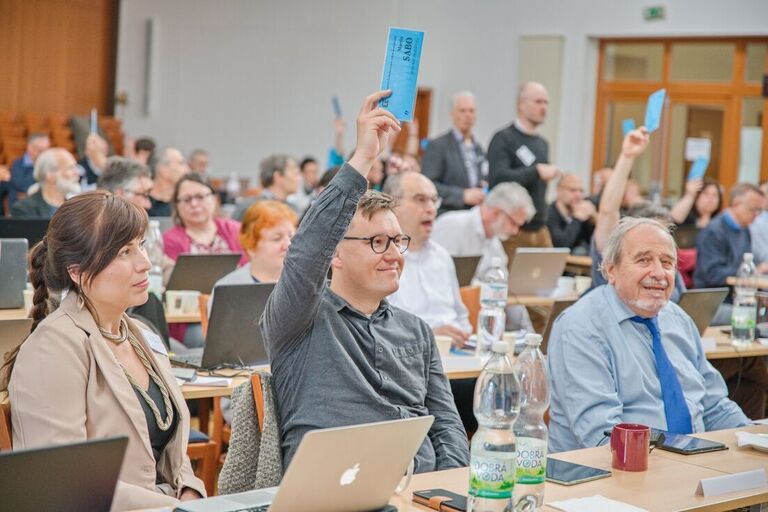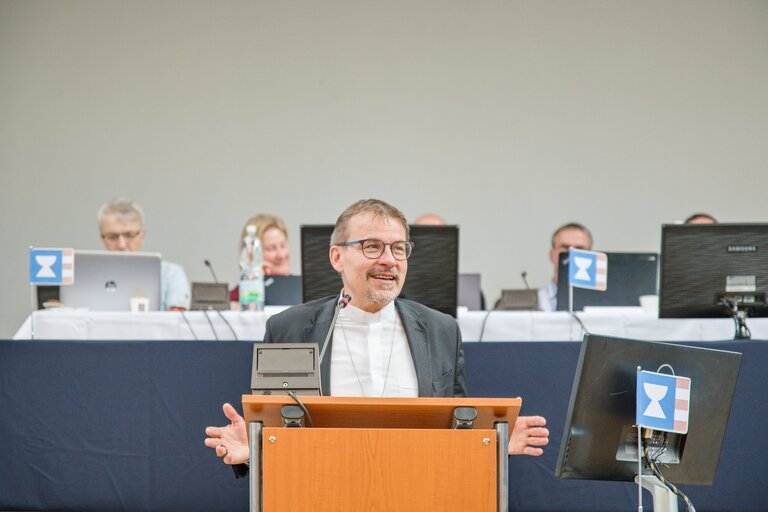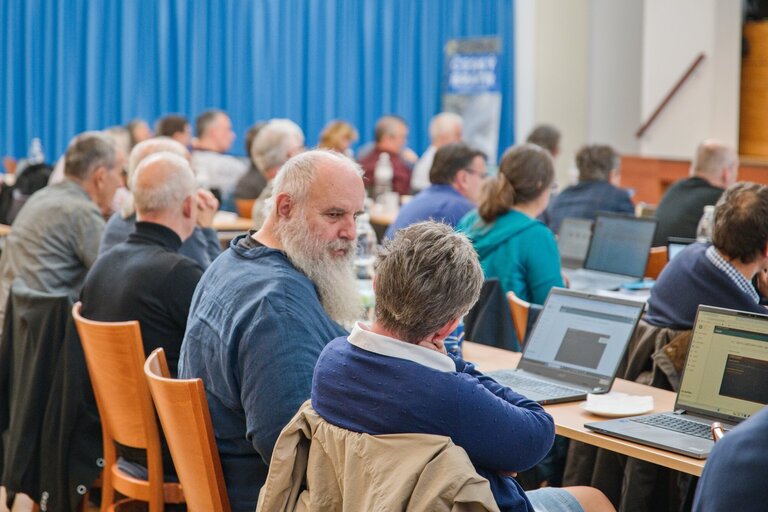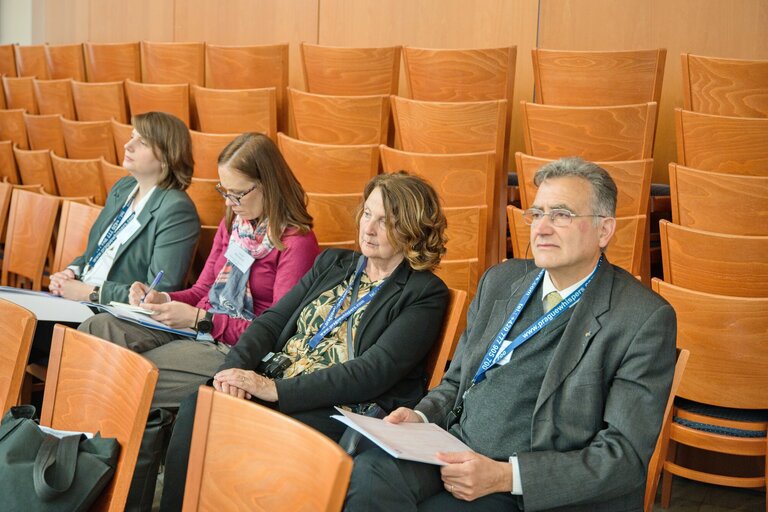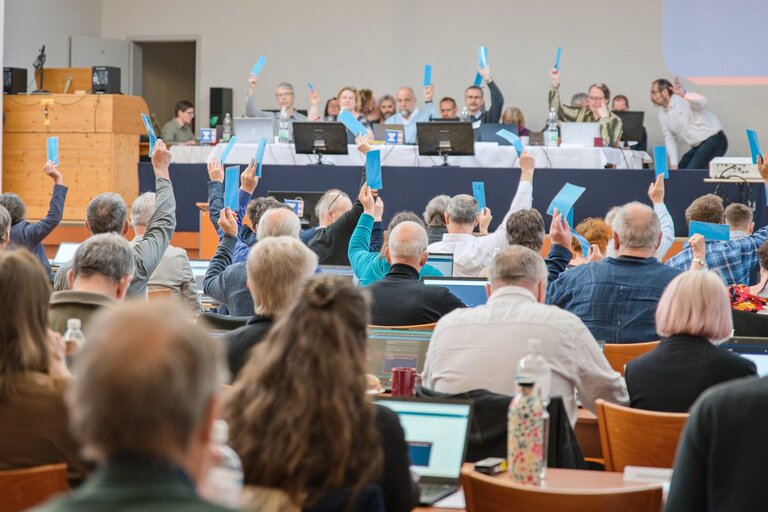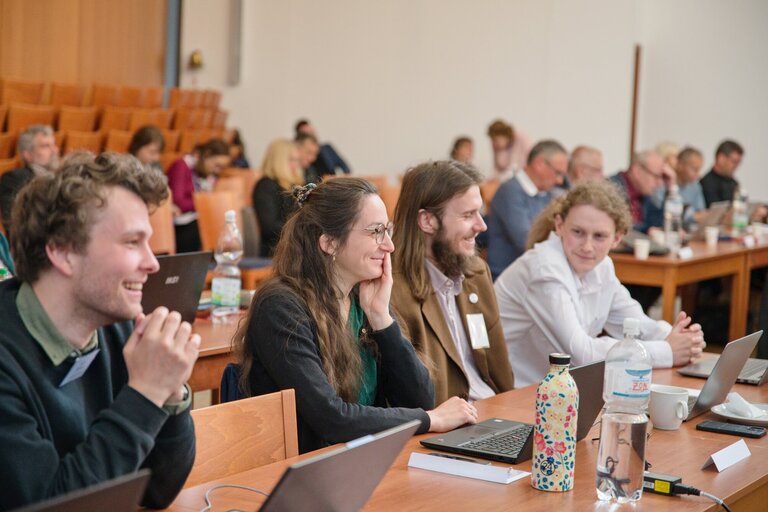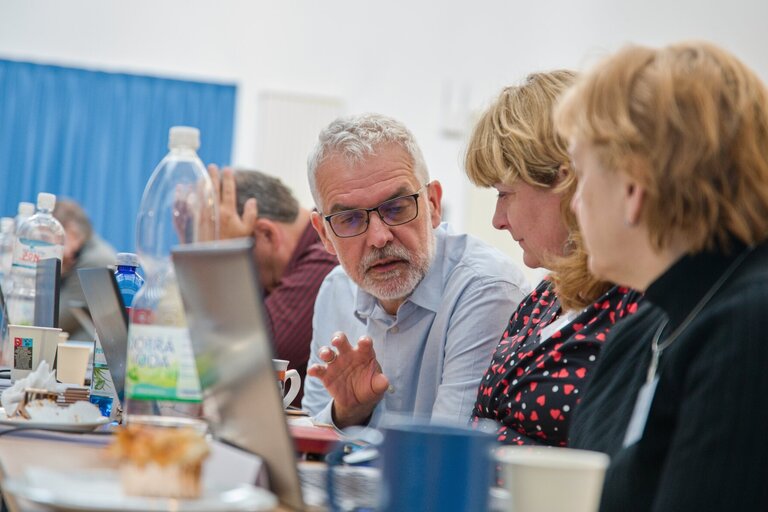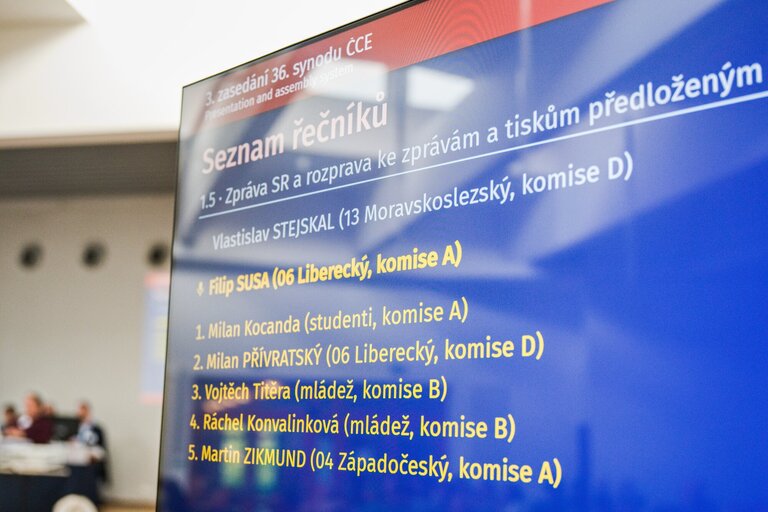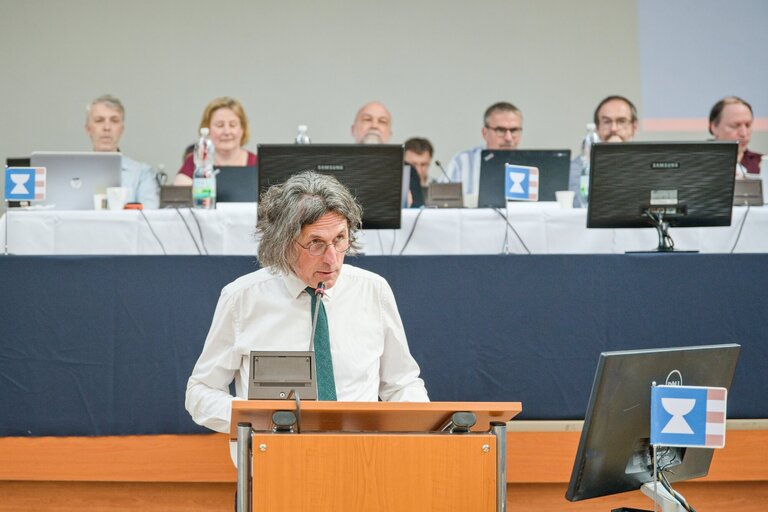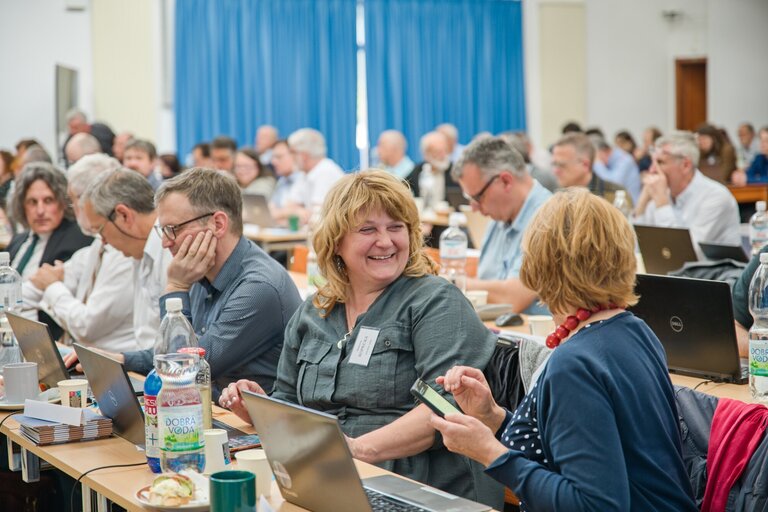Report from this year's synod
The 3rd session of the 36th Synod of the Evangelical Church of Czech Brethren took place at the Mother Teresa Community Centre in Prague-Háje from 15 to 17 May 2025. The agenda included economic issues, reform of church districts, pioneering missionary activities and the question of the contraction of partnerships for same-sex couples.
On the first day of the meeting, elections were held for the regional pastoral councils I–III, a deputy for the commission for evaluating graduates of the pastoral and diaconate training, and a deputy for the vote counters who count the votes at the synod.
The elections were followed by a welcome address from one of the ecumenical guests. Speaking on behalf of the Roman Catholic Church was Tomáš Holub, Bishop of Plzeň and member of the Council for Ecumenism and Interreligious Relations of the Czech Bishops' Conference (ČBK), who also attended last year's synod. He conveyed greetings to those present from the new leadership of the ČBK, namely from the Archbishop of Olomouc, Josef Nuzík. He also mentioned Pope Francis, who died on Easter Monday this year, and the newly elected Pope Leo XIV. Finally, he thanked the Evangelical Church for its ecumenical activities and blessed the delegates. ‘I look forward to further joint projects,’ he concluded. On Friday morning, a foreign ecumenical guest, the minister of the Waldensian Church in Italy, Jonathan Terino, greeted the delegates of the Synod.
ADelegates from the 'young people', i.e. youth advisors to the synod and students from the Faculty of Protestant Theology, also played an active role in the negotiations. At their suggestion, the synod decided, for example, to publish a complete list of synod members, including their contact details. This is intended to help church members get in touch with their senior representatives. In practice, this change will already be noticeable at the next synod meeting.
Thursday evening was marked by the opening service with Holy Communion. In recent years, this has taken place in the Protestant church in Jižní Město. In a dialogue sermon, Štěpán Janča, member of the Synod Executive Committee and minister in Krnov, was supported by Simona Kopecká, deputy synod curator.
Photo gallery from the opening service of the Synod
(You can find the recording of the service HERE)
The service is traditionally attended by numerous guests from the Czech and international ecumenical communities. Maria Mountraki, member of the Steering Committee of the Conference of European Churches and youth advisor, greeted those present: "May the Holy Spirit guide your reflections during the synod. Be courageous and brave in your decisions, as your church has always been. (...) May your work continue to inspire, comfort and challenge, both within your church and in the wider ecumenical community," she encouraged the synod members.
During the service, those who had died between synod meetings were remembered and nine newly ordained clergy were introduced.
It will be made possible for same-sex partnerships to be contracted in the Church
On Friday, the topic of the possibility of assistance in the (civil) contraction of same-sex partnerships was on the agenda. The amendment to the Civil Code, which came into force in January 2025, changed the previous rights of same-sex partnerships. Among other things, the state extended the right to contract a civil partnership to churches that were already authorised to contract marriages between opposite-sex couples.
Since the ECCB had already advocated the possibility of blessing same-sex partnerships in 2023, the question now was whether the Church would also commit itself to allowing civil partnerships to be formally contracted in a church ceremony (so that the couple would not have to enter into a valid civil partnership at the registry office after the church blessing). This change in the law was already known at the last synod, but only recently. Therefore, last year's synod decided to take a slower approach and to determine the position of the individual congregations and seniorates on this option in the course of 2024. Ultimately, 12 of 14 ‘church districts’ voted in favour. One did not give a clear statement and one was against.
Based on this survey, this year's synod finally passed a resolution allowing clergy of the Evangelical Church of Czech Brethren who so wish to officially assist in the contracting of same-sex partnerships.
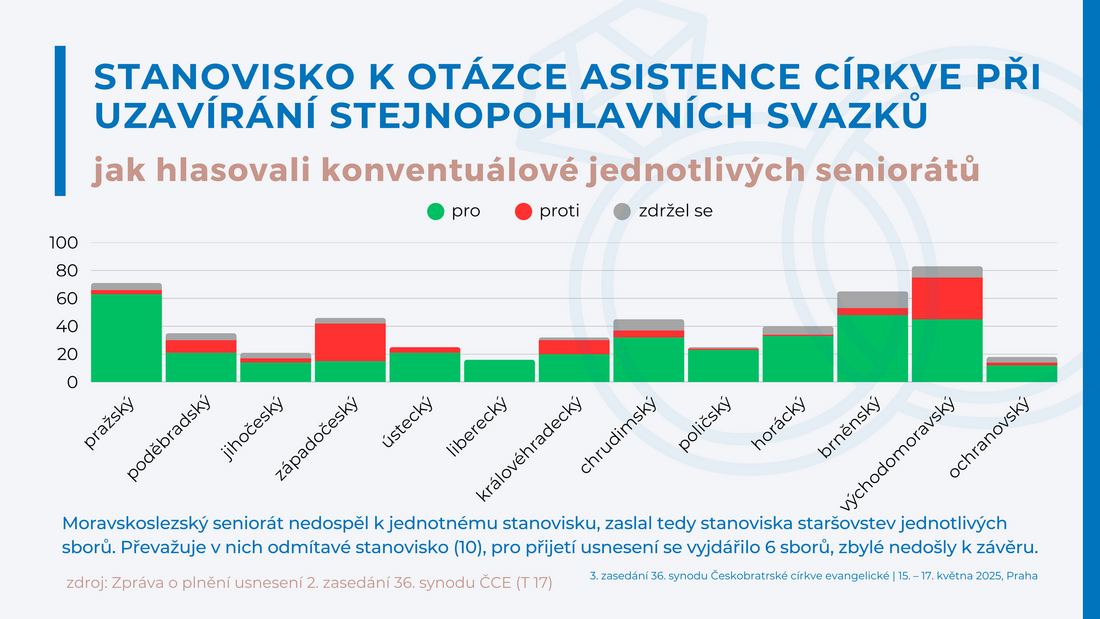 Voting results of the survey in the seniorates
Voting results of the survey in the seniorates
The members of the synod have approved the budget, the amount of contributions to the personnel fund and the distribution
The representatives traditionally dealt with economic matters. The annual financial statements for 2024 were approved. The plenary session also adopted the draft budget for the general congregation for 2025 and the church-wide allocation for 2026, which remained unchanged at CZK 8 million.
ℹ️ The church in figures:
(To control, please click on the arrows on the right and left.)
This section also includes information on the amount of contributions to the personnel fund, which is used to pay the salaries of the clergy. The Synod sets the amount of the contribution for the coming years and provides a non-binding forecast for subsequent years. The binding amount of the contribution to the personnel fund for 2027 is CZK 500,000 per full-time position (consisting of a lump sum of CZK 390,000 and a calculation basis for the pro rata amount of CZK 110,000). The approved indicative outlook for 2028, 2029 and 2030 is CZK 540,000, CZK 580,000 and CZK 620,000.
It appears that the church is managing its finances well. Whereas in the past, a target amount of approximately CZK 780,000 was estimated for 2031, a provisional amount that is CZK 100,000 lower, i.e. approximately CZK 680,000, is now being calculated for this year, in which the rapid growth in levies will come to an end and the amount will only rise in line with inflation.
In addition, a list of mandatory church-wide collections to be held in congregations in 2026 was adopted. Unlike in previous years, there will be no collections for Christian ministry, for printing and other publications, and no solidarity collections by congregations. This abolition will help to reduce the financial burden on church congregations. The general congregation will provide the funds to finance the above-mentioned activities from its budget or, where appropriate, from existing funds and instruments.
The new directors of the Diaconia centres of the ECCB introduced themselves to the plenary. Seven new female directors and one male director have taken up this position in the last period.
The Synod has adopted measures for the systematic management of real estate
The Synod dealt with the conversion of Jeronýmova Jednota into a subsidy system of the Church. ‘It is a small but systematic step that better explains what Jeronýmova Jednota and the collections are all about. I think this is a step in the right direction,’ said Synod curator Jiří Schneider.
The individual convents had also commented on the proposal in advance, having been presented with two options for the transformation. Most of them preferred the milder option, which provides for the existing structure of Jeronýmova Jednota to be retained under a more understandable name. In future, it will be called ‘Jeronýmova Jednota – stavební fond’ (Jeronýmova Jednota – Building Fund). Similarly, the name ‘Hlavní dar lásky’ (Main Donation of Love) will be changed to ‘Hlavní stavební projekt’ (Main Construction Project) and the collection ‘Jubilejní toleranční dar’ (Jubilee Donation of Tolerance) will be renamed ‘Sbírka na fond zápůjček’ (Collection for the Loan Fund).
As the proposal for compulsory contributions to the fund was rejected by a majority of the convents, a more robust system must be prepared, whereby congregations or individual donors can voluntarily contribute to a joint donation fund or directly to a specific project.
The construction of a new school is progressing successfully
The Synod took note of the information on the preparations for the construction of new schools for the Protestant Academy in Prague. The plan to build a new school building was approved at the extraordinary Synod in January this year. Since then, a tender has been held for a construction manager, whose main tasks will be technical supervision, coordination of occupational safety and price consulting. An external company is currently evaluating the results of the tender for the construction contractor. ‘The process is well underway,’ said Jiří Schneider.
During Friday's meeting, a church working group dealing with missionary activities was presented to the synod. It mentioned three pioneering projects currently underway: a food bank in Prague-Zbraslav, unconventional church services called ‘Nekostel’ and the ‘Ka-Dvojka’ missionary community in Karviná.
The future of the Domek Na Sboru house in Kunvald: the regional museum could take care of the exhibition
The synod members discussed the future of the Domek Na Sboru building in Kunvald. Despite its great symbolic significance for Protestants, there is currently no vibrant community or group of individuals in the vicinity of the historic building that could ensure its long-term preservation. Proper maintenance and development currently exceed the capacities of both the church and the town of Kunvald. In addition, costly renovation work is required.
The church is therefore considering the possibility of transferring it to another operator who would ensure the preservation and professional operation of the museum exhibition about the Brethren. The Pardubice Region has responded to this offer and, given the significance of the monument, is prepared to negotiate a takeover. Within the framework of the network of regional museums, it has been offered to transfer the building to the administration of the Regional Museum in Vysoké Mýto if necessary.
The synod has decided by a clear majority to remove the house ‘Domek Na Sboru’ from the list of inalienable properties of the church, which is a necessary prerequisite for the synodal council to continue negotiations on the sale of the property.
The Synod Curator also presented a support system for dealing with properties in need of renovation. A special website, peceostavby.e-cirkev.cz, has already been set up on this topic, where information on financing repairs to church properties and further details can be found. A pilot project involving ‘parish audits’ is currently underway, the results of which will be used to make non-binding recommendations on how to deal with properties. In future, such advice will be available to all congregations.
The Synod set a minimum age for assistant ministers and also discussed new forms of church membership
On Saturday, among other things, the term of office of the church's administrative bodies was discussed. The proposal to reduce the term of office of the Council of Elders and the Seniorate Committee from six to four years was rejected.
The synod opened up the possibility of changing the age limit for voting rights. Active voting rights (the right to vote) could be granted to parishioners aged 16 and over (instead of 18 as at present), while passive voting rights (the right to be elected) could be granted to those aged 18 and over (instead of 21 as at present). The accepted proposal does not yet mean a change in the age limit, but rather the opening of a church-wide debate. As this is a change to the church constitution, the councils of elders and convents must comment on it.
|
Picture gallery of the 3rd session of the 36th Synod of the Evangelical Church of Czech Brethren |
A lengthy discussion was opened on the subject of the minimum age for assistant preachers. Until now, there has been no lower age limit, as the current form of lay preaching is historically linked to the institution of ordained presbyters. Over the course of the last year, more young people from among the ranks of the other church members have registered to take the assistant preacher examination. The examination board for applicants for the ministry of assistant preacher determined that preaching requires not only knowledge but also personal maturity and life experience. The delegates discussed at length whether the new age limit should be 21 years or 25 years, and finally decided on the lower limit.
The Synod has now given the pastoral councils the option of changing their legally binding decision on the publication of their decision (in accordance with Art. 14 (2) of the Pastoral Office Regulations) if it no longer corresponds to the current situation. A request to change the decision on publication can be made by a party to the proceedings or the administrative authority concerned.
The same procedure shall apply if the original decision did not contain any statement on publication. There was a lengthy discussion about the so-called new forms of church membership and the question of whether it is possible to be a member of the church even if one is not baptised in a particular congregation. This is related, for example, to pioneer locations, which are missionary activities that give rise to communities other than congregational communities.
The Synod commissioned the Synodal Council to draw up theses on baptism and participation in pioneer locations and to present the results to the 4th session of the 36th Synod. It also called on the councils of elders, seniorate committees and convents to discuss pioneer locations and new opportunities for the Church in proclaiming the Gospel.
The proposal by the minister for spiritual ministry, Zvonimír Šorm, concerning the possibility of appealing against the Synodal Council's decision not to issue instructions for the election of a preacher was rejected.
Finally, the Synod adopted a statement responding to the growing social tensions and existential insecurity in some regions of the Czech Republic. ‘The Evangelical Church of Czech Brethren observes with concern that social tensions and existential insecurity are growing in some regions of the Czech Republic. It therefore calls on its congregations to show openness, solidarity and concrete signs of closeness to people affected by poverty, exclusion or unjust treatment by society,’ it says. With this statement, the Synod also calls for the rejection of stigmatisation of socially disadvantaged people and condemns racism and anti-Gypsyism. The full text of the statement is available on the website synod.e-cirkev.cz.
The next, i.e. 4th, meeting of the 36th Synod will take place from 21 to 23 May 2026 in Cheb, western Bohemia.
